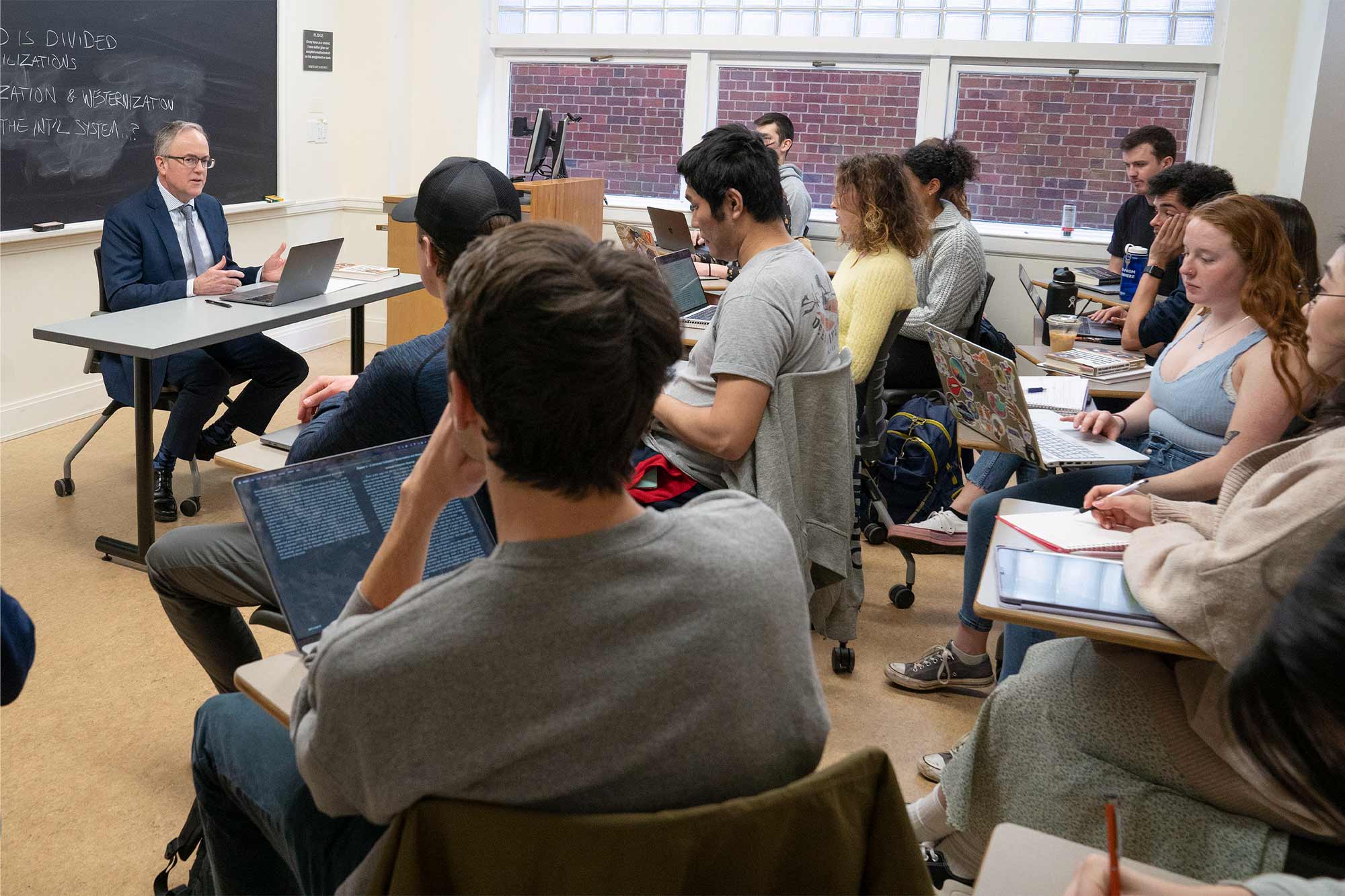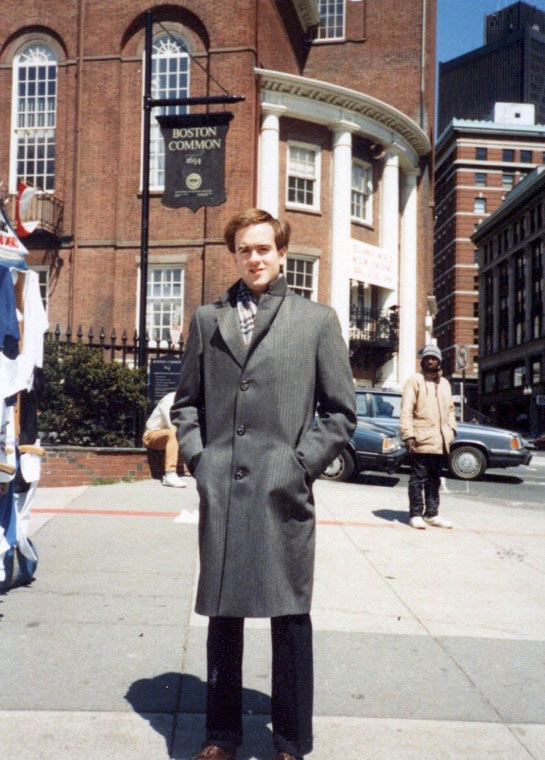Faculty Spotlight: John Owen Welcomes Healthy Debate About A Contentious World In His Classroom

Politics professor John Owen found George Orwell as an intellectual mentor early in life. (Photo by Dan Addison, University Communications)
Ideas matter to University of Virginia politics professor John M. Owen IV.
“Many scholars in the field really don’t talk about ideas,” said Owen, the Ambassador Henry J. and Mrs. Marion R. Taylor Professor of Politics, and a senior fellow at the Institute for Advanced Studies in Culture and the Miller Center for Public Affairs.
“International relations for them is about material power – weapons, ships, soldiers, technology or money. And ideas really aren’t a part of this picture, except in a trivial way. I’ve always thought that’s wrong. Ideas do matter,” he said. “The notion that politics is just about who has the most guns has never been satisfactory to me – it’s also who’s got the words and the ideas.”
Owen hones his viewpoints by discussing them with colleagues, such as Dale Copeland, the Hugh S. and Winnifred B. Cumming Memorial Professor of International Affairs, who often disagrees with him.
“Despite different starting points, John and I enjoy long conversations on how to explain burning issues, such as why Putin went into Ukraine; the role of Chinese pressure on Russia, if any; and most importantly, how both internal and external factors can be combined into a good explanation for great power behavior through the centuries,” Copeland said. “John represents the best of international relations scholarship in that he both puts forward new arguments of his own but remains open to the way factors outside his own approach might either qualify his findings or extend his argument in new directions.”
Owen, who received a bachelor’s degree from Duke University, a master of public administration degree from Princeton University and a Ph.D. from Harvard University, was introduced to politics as a child at his family’s supper table in Raleigh, North Carolina. His father, a United Methodist minister, was “publicly engaged.”
“I grew up in the 1960s and 1970s and we had the ABC Evening News with Peter Jennings on,” Owen said. “We would talk about what was going on. I remember the Vietnam War as a kid and asking my father what was up with that. It was part of the family discourse.”
His appetite was whetted more in college when a mentor, a mathematical demographer, took Owen to Vienna as a research assistant and he met counterparts from the Soviet Union.
“I was getting to know people from communist countries,” he said. “This was in 1984, five years before the Berlin Wall fell. And I found it really invigorating and important, interacting with these people, trying to figure them out.”
“The Russians were quite constrained,” Owen recalled. “A group of us started talking about their war in Afghanistan, fighting a war kind of like our Vietnam War, and they reached a point where they said, ‘We do not say anything. We agree with our country,’ or something like that. What they were really saying was ‘Please stop pushing us on this.’ That really struck me. I couldn’t have an honest conversation with someone because of politics, because they live under this regime where, while maybe they would like to speak frankly, they can’t do it.”
The book, not the year, “1984” is also significant to Owen, who first read George Orwell’s dystopian warning when he was 12.

John Owen draws ideas out of students during lively discussions in the classroom. (Photo by Dan Addison, University Communications)
“I remember it vividly,” he said. “I remember being quite taken with George Orwell’s concept of Newspeak, which the giant country in the book uses to restrict people’s thinking. It reduces the vocabulary. I was taken with how words can help construct thought and that through manipulation, a regime can actually stay in power by changing the language.”
Owen’s concern about the use and manipulation of language has stayed with him. Last spring, he participated in a panel discussion of free speech at UVA.
“We have had conversations about how faculty, students and others feel as if they couldn’t speak their minds completely, like they had to self-censor more than is appropriate in a university setting,” Owen said. “This was a bipartisan concern. There are people on the left and people on the right who want to restrict speech in various ways. There was a whole group of us at that event who want to make sure we stay focused on our University but remember that all universities are places of learning, first and foremost. And we are really hampering ourselves if we restrict speech and expression beyond certain pretty wide bounds.”
While Owen said there need to be ongoing discussions of what constitutes threatening speech, he did not think UVA was in crisis over free speech.
“I don’t see any problem in my classrooms,” he said. “If somebody says something in my class that you think is wrong, you should feel free to say that. You don’t have to agree with me. In fact, if you agree with me too readily, I’m going to suspect your motives – you’re trying to please the professor and get an A. You are going to have to back yourself up no matter what position you take. I make this clear at the outset, and students seem to like it.”
Owen has taught at UVA for 25 years and he views teaching as an essential element of his work.
“There is a synergy between teaching and research and writing,” he said. “I will sometimes try out ideas on my students. Last semester, I had my grad students read a book manuscript I had written. They made comments, they were helpful, I could change the manuscript a little bit. And I just thought that this is how the system ought to work. They get to see how the sausage is made. And then I ended up with a slightly better sausage, thanks to them. And so, everybody learned something.”
Owen solicits ideas in the classroom.
“I want students not to be simply passive recipients of knowledge, but to get grabbed by the ideas we’re unfolding in class,” Owen said. “Because I teach about international politics, what I’m teaching them is often controversial, or at least was once controversial, and the stakes are often big. So I try to take advantage of that.”
In large classes, he interrupts his lecture to throw out questions. In his smaller groups, he finds it easier to engage the students.

Owen is shown exploring American history in Boston around 1989. (Contributed photo)
“My typical method is to have students write short essays on some question about the readings that I assign in advance,” Owen said. “They submit their essays 24 hours before class. I read them and to some extent structure class around them. I call on them to defend what they wrote in their essays. I think it’s an important part of learning to state your ideas orally and have others respond to them.”
“Honors Tutorial in International Relations” is a third-year politics class held in a small room, with Owen and five students sitting in a semi-circle. Owen reviews the book the students were assigned for that week’s session, drawing information out of the students and directing the discussion.
Sitting quietly, legs crossed at the ankles, arms folded across his chest while listening to the students, Owen turns animated when explaining the points from the reading, his face lighting up, his hands moving quickly for emphasis. Owen floats a question and encourages the students to ponder the issue.
Ethan Marsh, a third-year political science and philosophy major, enjoys the class because of Owen’s ability to balance the points from the assigned reading with the students’ own critical analysis.
“I think this helps both because it allows us to develop thoughts and opinions based on what we learned in class, as well as to further develop or even sometimes change the views we write on in our weekly essays,” Marsh said. “Taking the time to make sure we understand the crux of each work’s argument is beyond helpful and ensures the rest of the class is as productive as possible as we begin to critically examine the ideas.”
Owen recently returned to teaching in the Politics Honors program after a five-year break, during which he taught other classes, chaired the politics department for three years and was on a research sabbatical, working on his next book, “The Ecology of Nations.”
“It’s one of many books coming out these days about what ails democracy,” Owen said. “Why do we all get the sense that our democracy is kind of wobbly right now? But I am looking from the outside, at the international order, and how that actually affects our own democracy. It’s complicated, because the United States is so powerful that it shapes the international order. There’s a back and forth. We’re shaping the order by setting certain rules in international institutions, promoting democracy in other countries, and that feeds back into our own politics.”
Owen has also written “Liberal Peace, Liberal War: American Politics and International Security,” “The Clash of Ideas in World Politics: Transnational Networks, States, and Regime Change 1510-2010,” and “Confronting Political Islam: Six Lessons from the West’s Past.” He co-authored, with Richard Rosecrance, “International Politics: How History Modifies Theory,” and co-edited “Religion, the Enlightenment, and the New Global Order.”
Owen keeps turning ideas over in his head.
“I’ve always been a lifelong learner and I’m curious about a lot of things,” he said. “But I have certain deep grooves in my mind so I’m still grappling with issues that grabbed me 30 years ago, in different ways. I’ve learned from some of my mistakes and there are ideas I held that I don’t hold any longer. But overall, I guess there’s more stability to my approach to the political world than I would have thought.”
We’re here to answer your questions! Contact us today.









